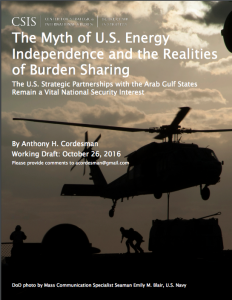Full Title: The Myth of U.S. Energy Independence and the Realities of Burden Sharing
Author(s): Anthony H. Cordesman
Publisher(s): Center for Strategic and International Studies
Publication Date: October 1, 2016
Full Text: Download Resource
Description (excerpt):
This analysis traces the key pressures that threaten the U.S. strategic partnership with the Gulf states, and show why they have reached a near crisis. It then focuses on the trends and data that show that the strategic importance of the stable flow of Gulf petroleum exports will not be reduced by increases in U.S. oil and gas production. Finally, it addresses the issue of burden sharing, and shows that the Arab Gulf states spend far more of their economies on national security and arms imports—most of which come from the United States and creates security forces that are interoperable with U.S. forces—than most countries in the world. In fact, the Gulf States cumulatively spend a larger portion of their economies on security than the United States spends on security This spending is so high in some Arab Gulf countries that it threatens their economic reform and development programs.
If the United States is to preserve and strengthen its strategic partnerships in the MENA region it needs to address these issues early in the next Administration. It needs to do so in ways that reflect a proper understanding of the needs and priorities of its Arab allies, of the strategic importance of playing a key role in security of the flow of Gulf energy exports, of the size of the burden the Arab Gulf states now bear in national security, and of the need to consider the Gulf States’ broader concerns for internal stability and economic development.
